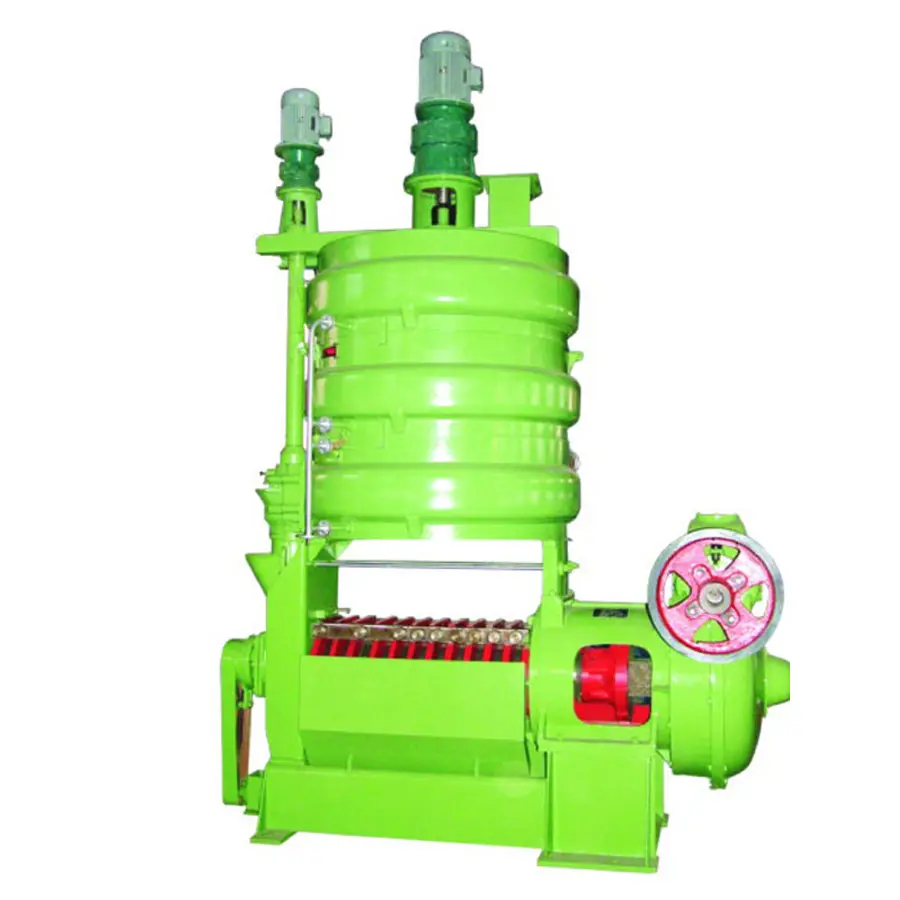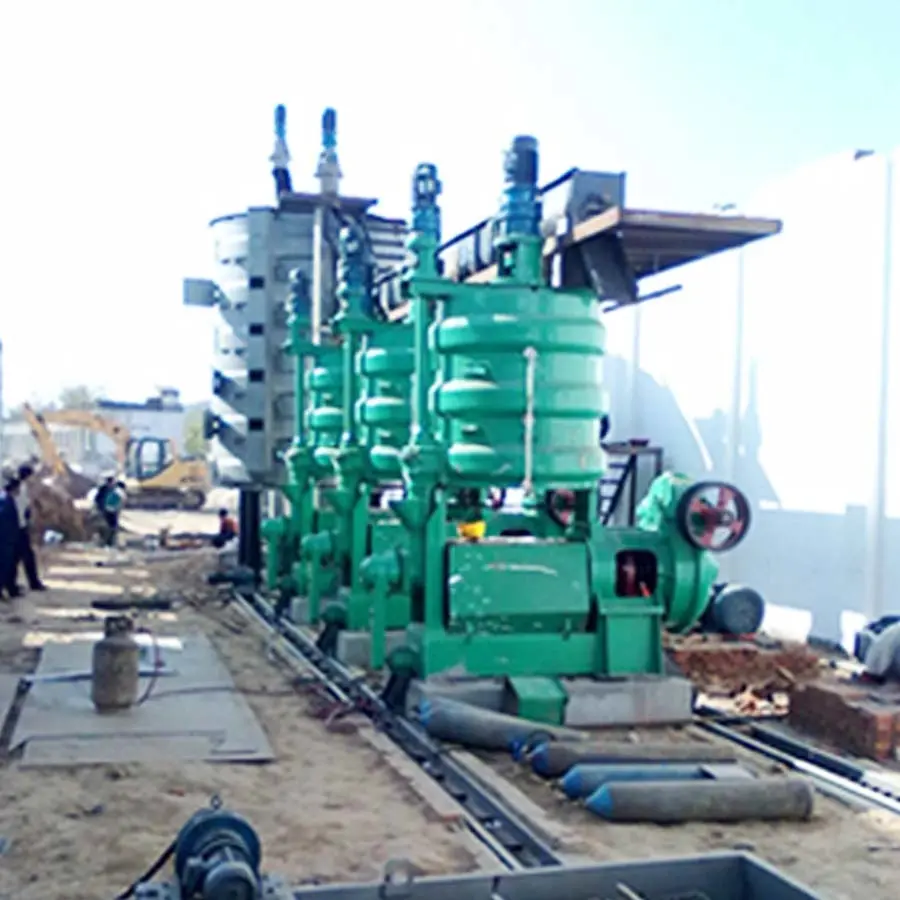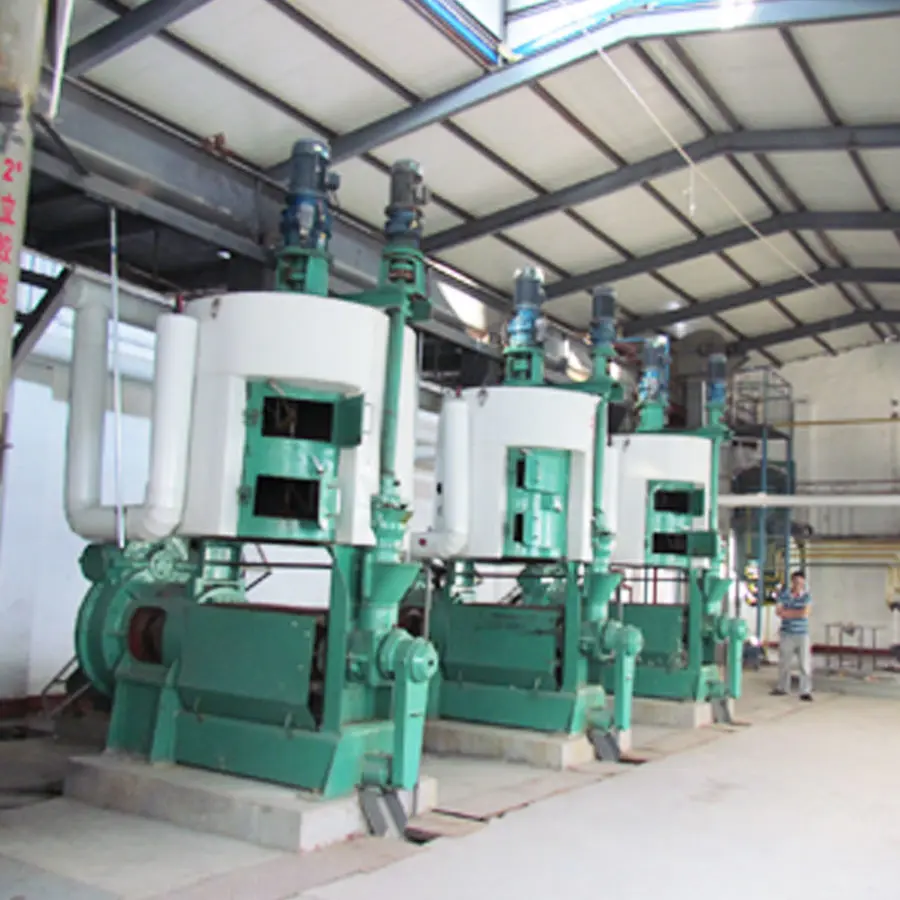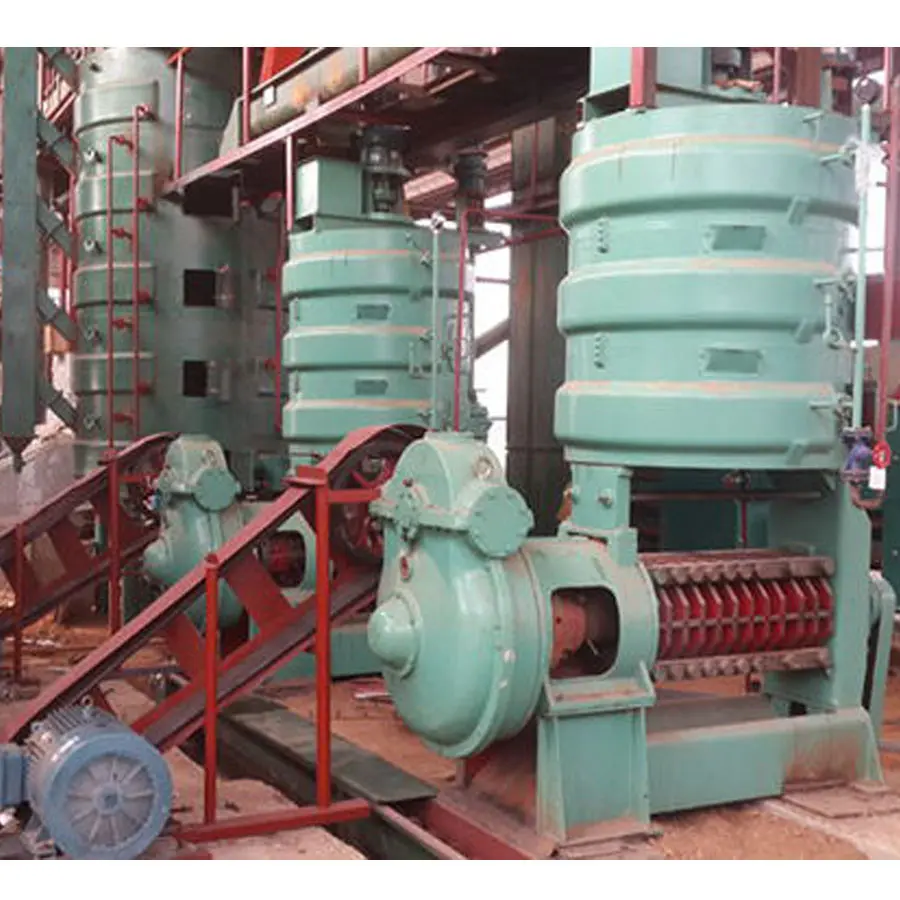Sep . 15, 2025 08:00 Back to list
High-Efficiency Industrial Soy Bean Oil Press Machine | Automatic
Industry Trends in Vegetable Oil Extraction and Processing
The global demand for vegetable oils, particularly soy oil, continues its upward trajectory, driven by increasing populations, evolving dietary patterns, and the burgeoning biofuel industry. This surge necessitates advanced, highly efficient, and sustainable extraction technologies. Modern industrial oil press machines are at the forefront of this evolution, focusing on optimizing oil yield, minimizing energy consumption, and ensuring the highest quality of both oil and meal by-products. Key trends include the integration of automation for reduced labor costs and consistent operation, enhanced material science for extended equipment lifespan, and robust compliance with international food safety and environmental regulations. Producers are increasingly investing in equipment that offers a low residual oil rate in the meal, thereby maximizing overall profitability and reducing waste, aligning with global sustainability goals. The market also observes a shift towards modular and scalable solutions, allowing operations to expand and adapt to fluctuating market demands without significant overhaul.
Furthermore, the emphasis on traceabilty and product purity from raw material to finished good is paramount. This pushes manufacturers to design machines that are easy to clean, made from food-grade materials, and incorporate advanced filtration systems. The convergence of IoT and AI is also beginning to impact this sector, with predictive maintenance capabilities and real-time operational analytics becoming standard features in high-end machinery. These technological advancements collectively aim to deliver superior performance, reduce operational expenditures, and secure a competitive edge in a dynamic global market.
Understanding the Industrial Soy Bean Oil Press Machine
The Industrial Soy Bean Oil Press Machine represents a critical component in the large-scale production of soybean oil and soy meal. Engineered for continuous, high-volume operation, this equipment utilizes mechanical force to extract oil from pre-treated soybeans. The process typically involves crushing the beans, often pre-heating them, and then feeding them into a press chamber where a helical screw (worm shaft) continuously compresses the material. This compression generates immense pressure and friction, causing the oil to separate and flow through small openings in the press cage, while the solid residue (soy meal) is discharged at the end of the cage.
Modern industrial presses are designed for maximum efficiency, characterized by high oil yield, low residual oil in the meal, and minimal energy consumption. They incorporate robust construction materials, precision-engineered components, and advanced control systems to ensure reliable performance and a long operational lifespan. The output, raw soybean oil, then proceeds to refining stages, while the soy meal, rich in protein, is primarily utilized in the animal feed industry. This mechanical extraction method is favored for its simplicity, cost-effectiveness, and the production of a high-quality, unadulterated oil.

Figure 1: High-capacity Industrial Soy Bean Oil Press Machine in operation.
Detailed Manufacturing Process of the Industrial Soy Bean Oil Press Machine
The production of a robust and efficient Industrial Soy Bean Oil Press Machine involves a meticulously controlled engineering and manufacturing process, ensuring both high performance and longevity. Each stage adheres to stringent quality protocols to deliver equipment capable of continuous heavy-duty operation.
- Raw Material Procurement & Inspection: High-grade materials are sourced, including specialized alloy steels for critical wear parts (e.g., worm shafts, press bars) and food-grade stainless steel (e.g., SUS304 or SUS316) for all components in contact with the soybean material or oil. Strict material certifications (e.g., ASTM, DIN) are verified upon reception to confirm chemical composition and mechanical properties.
- Casting and Forging of Main Components: Key structural elements such as the press cage housing, gearboxes, and large support frames are typically cast from high-strength ductile iron or steel alloys to provide superior rigidity and vibration damping. Critical components like worm shafts and press rings undergo precision forging to refine grain structure, enhancing strength, toughness, and wear resistance, which are paramount for components subjected to intense continuous pressure and friction.
- CNC Machining for Precision: Following casting or forging, components are subjected to advanced CNC (Computer Numerical Control) machining. This ensures extremely tight tolerances for crucial parts like the worm screw segments, press cage bars, and bearing seats. Precision machining is vital for achieving the optimal compression ratios, smooth operation, minimal wear, and ultimately, a high oil extraction rate with low residual oil in the meal.
- Heat Treatment for Durability: Essential wear parts, particularly the worm shaft and press rings, undergo specialized heat treatment processes such as carburizing, quenching, and tempering. This significantly increases their surface hardness (e.g., HRC 58-62 for worm segments) and core toughness, providing exceptional resistance to abrasion and fatigue, directly contributing to an extended service life of 15-20 years under normal operating conditions.
- Surface Treatment and Finishing: Components in contact with food products receive meticulous polishing and, if applicable, food-grade coatings to prevent contamination, ensure hygiene, and facilitate easy cleaning. External structural components are often finished with durable industrial paints or powder coatings for corrosion protection in demanding industrial environments (e.g., petrochemical, metallurgy, water supply & drainage applications where robust equipment is crucial).
- Assembly and Integration: All meticulously manufactured parts are then assembled by skilled technicians. This includes the precise alignment of the worm shaft, installation of bearings, motor, gearbox, and integration of electrical control systems. Each step is checked against detailed engineering drawings.
- Quality Control & Testing Standards: Every Industrial Soy Bean Oil Press Machine undergoes rigorous quality control and operational testing. This includes dimensional verification, material hardness testing, full load operational tests to assess stability, temperature profiles, noise levels, and vibration. Compliance with international standards such as ISO 9001 for quality management, ANSI/ASME for mechanical design, and relevant food safety directives (e.g., FDA guidelines for food contact surfaces) is mandatory. Energy efficiency is also tested, demonstrating advantages like optimized motor usage and low-friction designs that lead to significant energy savings. Furthermore, corrosion resistance is inherent in the material selection and surface treatments, ensuring reliable operation even in humid or chemically exposed environments.

Figure 2: Interior view of the press cage and worm shaft, highlighting precision engineering.
Technical Specifications and Parameters
To assist B2B decision-makers and engineers in evaluating the performance capabilities of a high-efficiency Industrial Soy Bean Oil Press Machine, the following table provides typical technical specifications. These parameters are crucial for assessing throughput, operational efficiency, and overall suitability for specific industrial applications.
| Parameter | Value / Range | Unit | Notes |
|---|---|---|---|
| Processing Capacity (Soybeans) | 10 - 50+ | Tons/Day | Varies by model and specific soybean characteristics. |
| Residual Oil Rate in Meal | ≤ 6.0 - 8.0 | % | Crucial for overall yield and profitability. |
| Motor Power | 22 - 75 | kW | Typically high-efficiency IE3/IE4 motors. |
| Weight (Approx.) | 3,000 - 8,000 | kg | Indicates robust construction. |
| Dimensions (L x W x H) | ~2.5 x 1.2 x 2.0 | meters | Footprint consideration for plant layout. |
| Material of Contact Parts | Food-grade Stainless Steel (SUS304/316) | N/A | Ensures hygiene and corrosion resistance. |
| Operating Temperature (Pre-press) | 80 - 110 | °C | Optimized for oil flow and enzyme denaturation. |
| Noise Level | ≤ 85 | dB(A) | Compliance with industrial health and safety standards. |
| Certifications | ISO 9001, CE, HACCP (design consideration) | N/A | Ensures quality management and product safety. |
| Power Supply | 3-phase, 380V/50Hz or customized | N/A | Adaptable to regional electrical standards. |
Application Scenarios of the Industrial Soy Bean Oil Press Machine
The versatility and efficiency of the Industrial Soy Bean Oil Press Machine make it indispensable across a range of industrial sectors. Its primary function is the efficient extraction of oil and the production of high-quality protein-rich meal, both of which have significant commercial value.
- Food Oil Production: This is the most prevalent application. Crude soybean oil extracted by the press is further refined into edible cooking oil, used in margarine, salad dressings, and a wide array of processed foods. The mechanical pressing method yields a purer oil initially, which can sometimes reduce the subsequent refining load.
- Animal Feed Industry: The defatted soy meal, a high-protein by-product, is a cornerstone of the animal feed industry. It serves as a vital protein source for poultry, swine, aquaculture, and cattle feeds. The quality of the meal, particularly its protein content and digestibility, is directly influenced by the efficiency of the oil extraction process.
- Biofuel Production: Soybean oil is a significant feedstock for biodiesel production. Industrial presses provide the necessary volume of crude oil for large-scale biofuel initiatives, contributing to renewable energy solutions. The efficiency of oil extraction directly impacts the economic viability of these operations.
- Industrial Chemical Applications: Beyond food and feed, soybean oil derivatives are used in various industrial applications, including paints, varnishes, plastics, and lubricants. The ability of the press to supply consistent volumes of crude oil is crucial for manufacturers in these chemical sectors.
In all these scenarios, the pressing machine's ability to maintain a high throughput while achieving a low residual oil rate is paramount. For instance, in a large-scale food oil facility processing 100 tons of soybeans per day, a 1% reduction in residual oil can translate to significant additional oil yield, potentially thousands of dollars in extra revenue daily. This highlights the critical impact of an efficient Industrial Soy Bean Oil Press Machine on operational profitability and resource utilization.

Figure 3: Integrated oil pressing and meal discharge system for continuous operation.
Technical Advantages and Operational Efficiency
The modern Industrial Soy Bean Oil Press Machine incorporates several technical advantages that collectively contribute to superior operational efficiency, enhanced product quality, and a strong return on investment for industrial-scale processors.
- High Oil Extraction Rate: Through optimized worm shaft designs and precisely machined press cages, these machines achieve a remarkably low residual oil content in the meal (typically ≤ 6.0-8.0%). This maximizes oil yield per ton of soybeans processed, directly enhancing profitability.
- Energy Efficiency: Equipped with high-efficiency motors (e.g., IE3/IE4 standards) and advanced gearbox systems, the power consumption per ton of processed material is minimized. The design also reduces internal friction and heat loss, contributing to lower operational energy costs.
- Durability and Extended Service Life: Constructed from high-strength alloy steels and food-grade stainless steel, with critical wear parts undergoing specialized heat treatments, these machines are built to withstand continuous, heavy-duty operation. This results in a service life often exceeding 15-20 years with proper maintenance, significantly reducing replacement cycles and capital expenditure.
- Ease of Operation and Maintenance: Designed with user-friendliness in mind, modern presses often feature intuitive control panels and accessible components for routine cleaning and maintenance. Automated lubrication systems and modular designs further simplify upkeep, minimizing downtime.
- Advanced Automation and Control: Integration of PLC-based control systems allows for precise monitoring and adjustment of operational parameters such as feed rate, temperature, and pressure. This ensures consistent product quality and optimizes performance with minimal human intervention.
- Robust Safety Features: Comprehensive safety interlocks, emergency stop mechanisms, and protective guarding comply with international safety standards (e.g., CE, OSHA), ensuring operator safety during all phases of operation.
- Food Safety Compliance: All surfaces in contact with soybeans or oil are constructed from food-grade materials (e.g., SUS304/316 stainless steel) and are designed for easy cleaning, adhering to strict hygiene and food safety regulations such as HACCP and FDA guidelines.
These advantages ensure that investing in a high-quality Industrial Soy Bean Oil Press Machine not only meets current production demands but also provides a sustainable and economically sound solution for future growth.
Vendor Comparison: Choosing Your Industrial Soy Bean Oil Press Machine Partner
Selecting the right supplier for an Industrial Soy Bean Oil Press Machine is a critical decision that impacts long-term operational success, maintenance costs, and product quality. A thorough vendor comparison should extend beyond initial purchase price to encompass technology, reliability, after-sales support, and adherence to industry standards.
| Feature/Criteria | Leading Manufacturer (e.g., OilMillChina) | Generic Vendor A | Generic Vendor B |
|---|---|---|---|
| Oil Extraction Rate (Residual Oil) | ≤ 6.0% (High efficiency) | 7.0 - 9.0% | ≥ 9.0% (Variable) |
| Material Quality (Contact Parts) | SUS304/316 Food-Grade Stainless Steel | Mixed grades, often lower spec SS or carbon steel | Standard steel, prone to corrosion |
| Worm Shaft Hardness (HRC) | 58-62 HRC (Carburized and quenched) | 45-55 HRC (Basic heat treatment) | < 45 HRC (Limited durability) |
| Automation & Controls | PLC-controlled, real-time monitoring | Basic electromechanical controls | Manual or limited automatic control |
| Certifications | ISO 9001, CE, HACCP compliant design | Partial or general CE/ISO | Limited or no verifiable certifications |
| Warranty (Major Components) | 18-24 Months | 12 Months | 6-12 Months (Limited) |
| After-Sales Support | 24/7 technical support, on-site service, spare parts availability | Standard business hours, limited on-site support | Basic email support, spare parts delays |
| Customization Capability | High: Capacity, integration, material specs | Limited capacity modifications | Standard models only |
This comparison highlights the importance of evaluating a vendor's commitment to quality, technological advancement, and customer support. While a lower upfront cost from a generic vendor might seem appealing, it often translates into higher operational costs, frequent maintenance, reduced efficiency, and a shorter equipment lifespan, ultimately impacting the total cost of ownership (TCO).

Figure 4: A robust gear assembly, central to the press's power transmission.
Customized Solutions for Specific Operational Needs
Recognizing that no two industrial operations are identical, leading manufacturers of the Industrial Soy Bean Oil Press Machine offer comprehensive customized solutions. This bespoke approach ensures that the equipment seamlessly integrates into existing production lines, addresses unique raw material characteristics, and meets specific output requirements and regulatory standards.
Customization options can include varying capacities, from mid-scale operations needing 10 tons/day to large industrial complexes requiring 50+ tons/day. This might involve scaling up the number of pressing stages, optimizing screw configurations, or integrating pre-treatment and post-treatment equipment. Material requirements can also be tailored; for facilities processing specific organic or high-value soybeans, the use of enhanced food-grade stainless steel (e.g., higher grade SUS316L) for all contact surfaces can be specified to meet stricter hygiene or corrosion resistance demands.
Furthermore, automation levels can be adjusted, from semi-automatic systems to fully automated lines with integrated seed cleaning, conditioning, oil filtration, and meal handling systems. Electrical specifications are always adapted to regional power grids (e.g., 380V/50Hz, 480V/60Hz), and control interfaces can be designed for multilingual operation or integration with plant-wide SCADA systems. By offering such flexibility, manufacturers ensure that the Industrial Soy Bean Oil Press Machine delivers optimal performance and maximum ROI within the unique confines of each client's operational environment.
Real-World Application Case Studies
Our expertise in providing advanced industrial oil extraction solutions is demonstrated through successful deployments across diverse operational landscapes. These case studies highlight the tangible benefits achieved by clients utilizing our Industrial Soy Bean Oil Press Machine.
Case Study 1: Large-Scale Food Oil Production Facility - Southeast Asia
Client Profile: A prominent food processing conglomerate in Southeast Asia, aiming to expand its soybean oil production capacity and reduce reliance on solvent extraction methods.
Challenge: The client's existing pressing machinery suffered from frequent breakdowns, high energy consumption, and an unacceptably high residual oil rate (averaging 10-12%), leading to significant material loss and inconsistent oil quality. They needed a robust, high-capacity solution that could operate continuously with minimal oversight.
Solution: We supplied and commissioned a customized series of our 50-ton/day Industrial Soy Bean Oil Press Machine units, designed for integrated, continuous operation. The machines featured reinforced press cages, advanced heat-treated worm shafts, and a PLC-controlled automation system for optimized feeding and pressing parameters. Our engineering team provided comprehensive installation and operational training.
Results: Within three months of commissioning, the facility reported a consistent residual oil rate of 6.5%, a substantial improvement from their previous average. This translated to an additional 4.5 tons of oil per day across their entire line, resulting in an estimated annual revenue increase of over $1.5 million. Energy consumption per ton of processed soybeans decreased by 18%, and unscheduled downtime was reduced by 60%, significantly improving overall plant efficiency and profitability. The client subsequently placed an order for additional units for their expansion phase, citing our machines' reliability and the strong technical support provided.
Case Study 2: Integrated Animal Feed Plant - South America
Client Profile: A large animal feed manufacturer in South America seeking to produce high-quality soy meal for their proprietary feed formulations while also generating revenue from extracted soybean oil.
Challenge: The client required a pressing solution that not only maximized oil yield but critically, produced a soy meal with optimal protein digestibility and nutrient profile, free from solvent residues. Their existing equipment could not consistently meet these stringent quality requirements for animal feed applications.
Solution: We provided a 30-ton/day Industrial Soy Bean Oil Press Machine, configured with specific pre-conditioning and pressing parameters to ensure a gentle yet effective oil extraction. The machine's design prioritized minimal heat degradation of the meal protein and included integrated chilling mechanisms for the discharged meal to preserve its nutritional integrity. Specialized food-grade material specifications were also implemented for all meal contact surfaces.
Results: The new press achieved a consistent residual oil rate of 7.0%, while the quality of the soy meal significantly improved. Lab analyses confirmed that the meal maintained a higher protein solubility index and superior amino acid profiles compared to their previous output, directly benefiting their animal feed formulations. This allowed the client to command a premium for their feed products and generated a new revenue stream from the extracted soybean oil, which met local food-grade standards for human consumption. The system's robustness ensured continuous operation even with regional power fluctuations, leading to a demonstrable ROI within two years.

Figure 5: High-capacity feeder and pre-treatment module of an Industrial Soy Bean Oil Press Machine.
Frequently Asked Questions (FAQ)
Q1: What is the typical oil extraction rate for soybeans using your Industrial Soy Bean Oil Press Machine?
A1: Our advanced Industrial Soy Bean Oil Press Machine typically achieves a residual oil rate in the meal of ≤ 6.0-8.0%, translating to an oil extraction efficiency that maximizes your yield from raw soybeans. This rate can vary slightly depending on the initial moisture content, quality of the soybeans, and pre-treatment processes.
Q2: What are the primary maintenance requirements for the machine?
A2: Routine maintenance includes daily checks of lubrication levels, cleaning of the press cage and filtering screens, and regular inspection of wear parts like worm segments and press bars. We recommend periodic replacement of bearings and seals, typically on an annual or bi-annual basis, depending on usage intensity. Detailed maintenance schedules are provided in the operational manual, and our support team offers training.
Q3: Can this machine process other oilseeds besides soybeans?
A3: While specifically optimized for soybeans, our Industrial Soy Bean Oil Press Machine can be adapted to process a variety of other oilseeds such as rapeseed, sunflower seeds, and groundnuts with minor adjustments to settings and potentially some wear parts. We offer customized configurations and expert advice for multi-seed processing requirements.
Q4: What are the typical power requirements for your industrial presses?
A4: The power requirements vary depending on the machine's capacity. For a medium-capacity unit (e.g., 20-30 tons/day), the main motor power can range from 30 kW to 55 kW. All machines are designed for industrial 3-phase power supply and can be adapted to local voltage and frequency standards (e.g., 380V/50Hz, 480V/60Hz).
Q5: How long does the installation and commissioning typically take?
A5: Installation time depends on the specific model and the complexity of integration into an existing plant. For a standalone Industrial Soy Bean Oil Press Machine, installation typically takes 3-5 days. Commissioning and initial operational testing can take an additional 2-3 days, including operator training. For complete lines, this timeframe will be extended based on project scope.
Lead Time, Fulfillment, and Logistics
We understand the critical importance of timely delivery for industrial projects. Our streamlined manufacturing and logistics processes are designed to ensure efficient fulfillment of orders for the Industrial Soy Bean Oil Press Machine and related equipment.
- Manufacturing Lead Time: Standard models of our Industrial Soy Bean Oil Press Machine typically have a lead time of 6-8 weeks from order confirmation to readiness for shipment. Customized solutions or larger integrated lines may require 10-14 weeks, depending on the complexity of engineering and component sourcing.
- Global Logistics: We partner with reputable international freight forwarders to manage shipping to any global destination. We provide comprehensive logistics support, including export documentation, customs clearance assistance, and various shipping options (FOB, CIF, DDP) to best suit client needs. Our machines are securely packed in robust wooden crates or container111s, ensuring protection during transit.
- Installation and Commissioning: Upon equipment arrival at your site, our expert field engineers are available to provide on-site installation supervision and commissioning services, ensuring proper setup and optimal operational performance. This service includes initial testing, fine-tuning, and hands-on training for your operating personnel.

Figure 6: Automated control panel for the Industrial Soy Bean Oil Press Machine, ensuring precision and safety.
Warranty and After-Sales Support
Our commitment to client success extends far beyond the point of sale. We provide comprehensive warranty and robust after-sales support to ensure the continuous, reliable operation of your Industrial Soy Bean Oil Press Machine.
- Warranty Commitment: Each Industrial Soy Bean Oil Press Machine comes with a standard 18-month warranty on major mechanical components and 12 months on electrical components, effective from the date of commissioning or 24 months from shipment, whichever comes first. This warranty covers manufacturing defects and ensures free replacement or repair of faulty parts.
- Technical Support: Our dedicated technical support team is available 24/7 to address any operational queries or troubleshooting needs. We offer remote diagnostics, online guidance, and prompt communication to minimize downtime.
- Spare Parts Availability: We maintain a comprehensive inventory of genuine spare parts, ensuring rapid dispatch and delivery worldwide. Critical wear parts are readily available to support continuous operations and scheduled maintenance, minimizing potential production interruptions.
- Training Programs: We offer tailored training programs for your operational and maintenance staff, either on-site during commissioning or at our facilities. These programs cover safe operation, routine maintenance, troubleshooting, and optimal performance management.
- Long-Term Service Agreements: For clients seeking extended peace of mind, we offer customized long-term service agreements that can include preventive maintenance, regular inspections, and preferential rates for spare parts and emergency services.
References
- FAO Corporate Document Repository, "Oilseed processing: Extraction of vegetable oils". Food and Agriculture Organization of the United Nations.
- American Oil Chemists' Society (AOCS) Official Methods and Recommended Practices.
- International Organization for Standardization (ISO) 9001:2015 Quality management systems.
- U.S. Food and Drug Administration (FDA) Guidance for Industry: Hazard Analysis and Critical Control Point (HACCP) Principles.
- USDA Foreign Agricultural Service, "Oilseeds: World Markets and Trade" reports.
-
Mustard Oil Extraction Machine: A Complete Guide to Industry, Technology & Future Trends
NewsNov.20,2025
-
Groundnut Oil Extraction Machine | Efficient Peanut Oil Press Solutions
NewsNov.20,2025
-
Manual Oil Press Machine: Sustainable Oil Extraction for Global Communities | Buy & Learn More
NewsNov.19,2025
-
Efficient Peanut Oil Machine Solutions for Sustainable Oil Extraction
NewsNov.19,2025
-
Essential Oil Extraction Machine: Unlocking Quality & Sustainability in Oil Production
NewsNov.18,2025
-
Latest Oil Expeller – Efficient & Sustainable Oil Extraction Machines
NewsNov.18,2025
